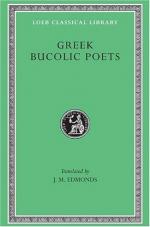|
This section contains 10,918 words (approx. 37 pages at 300 words per page) |

|
SOURCE: “Poetic Succession and the Genesis of Alexandrian Bucolic,” in The Pipes of Pan: Intertextuality and Literary Filiation in the Pastoral Tradition from Theocritus to Milton, The University of Michigan Press, 1998, pp. 19-44.
In the following excerpt, Hubbard focuses on the stylistic qualities that made Theocritus so influential on his successors.
The quest for a pre-Theocritean form of bucolic poetry has proven unproductive for scholars, whether they have sought it in country songs, religious ritual, archaic lyric, or even Near Eastern traditions.1 The most that can be found in some of these traditions are occasional strands of pastoral imagery, as was likely also true of Theocritus' influential predecessor Philetas.2 It is by now a commonplace of scholarship to declare Theocritus the sole inventor of the bucolic genre. But it may be theoretically misleading to do so, since a genre by definition must be a set of formal expectations...
|
This section contains 10,918 words (approx. 37 pages at 300 words per page) |

|


